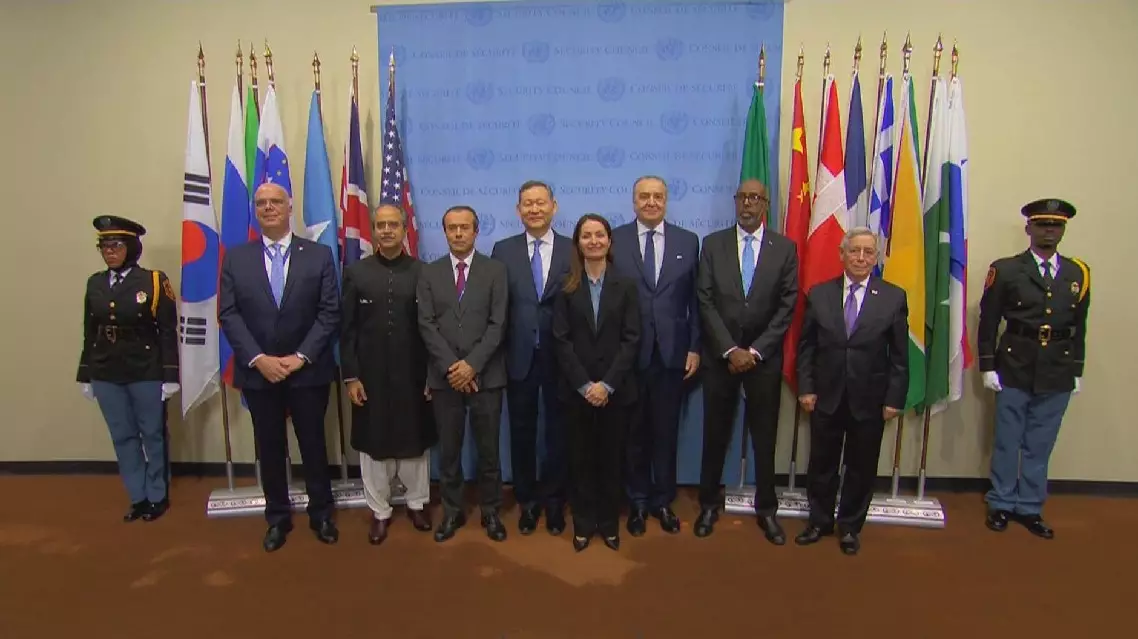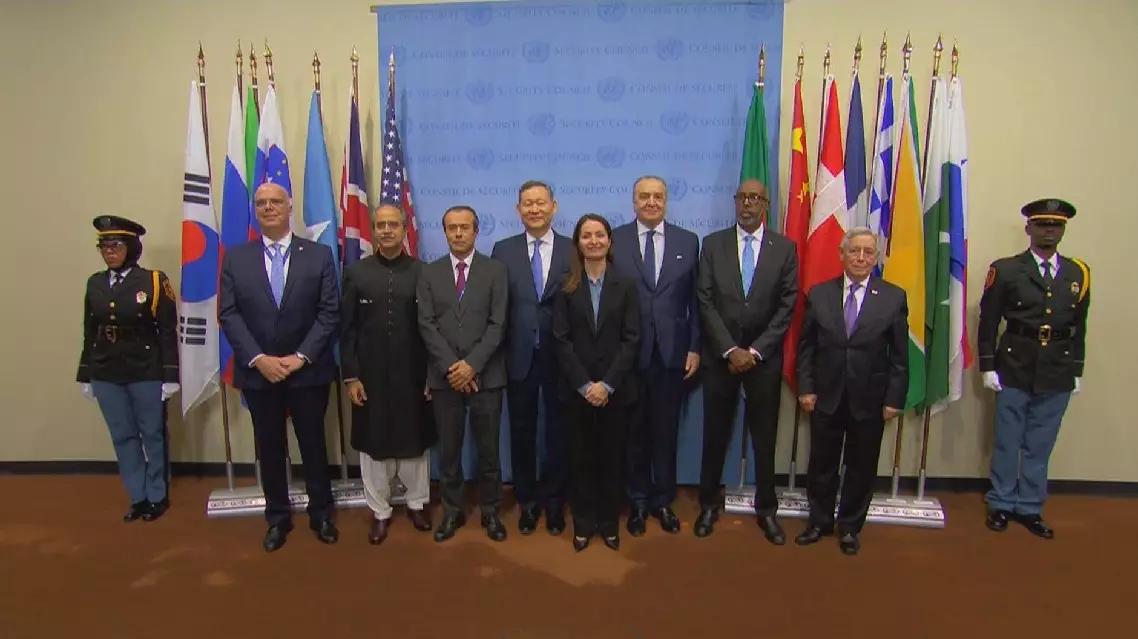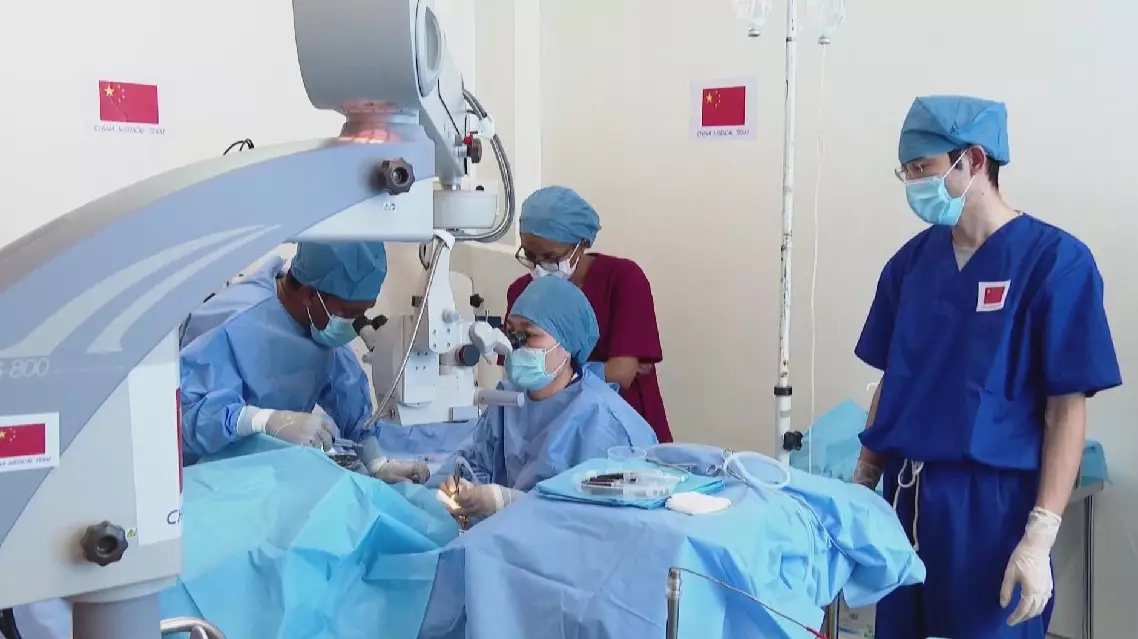Denmark, Greece, Pakistan, Panama and Somalia on Thursday began to assume responsibilities as non-permanent members of the United Nations Security Council.
Their two-year term officially started on Jan 1. Thursday is the first working day of the council for 2025 after the Christmas and New Year break.
The five countries replaced Ecuador, Japan, Malta, Mozambique and Switzerland.
A flag installation ceremony was held at the United Nations headquarters in New York to mark the start of their responsibilities.
Kazakh UN ambassador Kairat Umarov, who presided over the ceremony, congratulated the five new council members and wished them success in their two-year term.
The flag installation ceremony for new Security Council members was initiated by Kazakhstan in 2018.
Algerian UN ambassador Amar Bendjama, in his capacity as president of the Security Council for the month of January, thanked the outgoing members and welcomed the newcomers.
He said that it is an "immense privilege" as well as "a huge responsibility" to serve in the Security Council, calling on all council members to work tirelessly and effectively to address the challenges facing the world "and uphold the values of multilateralism".
The permanent representatives of the five new members made short speeches before they installed their respective national flags outside the Security Council Chamber.
The 15-member Security Council has five permanent members -- Britain, China, France, Russia and the United States, and 10 non-permanent members elected for two-year terms by the UN General Assembly. Five non-permanent members are replaced every year.

Five countries assume responsibilities as elected members of UN Security Council

FIve countries assume responsibilities as elected members of UN Security Council
A Chinese medical team from Tianjin Eye Hospital has officially launched a free cataract surgery campaign at Tirunesh Beijing Hospital in Addis Ababa, the capital of Ethiopia.
Under the name of China-Ethiopia Brightness Journey, the Chinese medical team consisting of 10 senior ophthalmologists and nurses is set to conduct cataract surgery for more than 500 eye patients, with 80 of them having already enjoyed successful operations as of Friday. This round of the China-Ethiopia Brightness Journey will run for more than 20 days.
Amsale Belay is among the beneficiaries of the project. With help from the Chinese medical team, her vision has finally been restored.
"I'm so indebted to the medical team. I have been seeking treatment for more than two and a half years at various hospitals, but I found no solution. I was told there was no hope. But now, I have full hope," she said.
Local medics are also gaining invaluable experience in advanced treatment methods.
"We have been using manual machines for cataract surgeries. We lacked training and skilled personnel to perform surgeries with modern equipment. Now, as you can see, we are gaining high-level technological expertise and experience from the Chinese experts," said Yilikal Berhanu, a senior ophthalmologist.
"So far, we have conducted surgeries for four days. We are also actively training local doctors, hoping that they will be able to perform surgeries by themselves before we leave," said Wei Yinjun, deputy chief physician of the China-Ethiopia Brightness Journey Expert Group.
Speaking at the launch event of the project on Friday, Ethiopian Minister of Health Mekdes Daba said that the project offers far-reaching benefits.
"We will be building skills for healthcare professionals in here because through the procedures, through the one-to-one lessons, one-to-one interactions that we have, our community will have an additional shared experience, hands-on experience. We really, deeply value this project and the support that we are getting," said Daba.
Chinese Ambassador to Ethiopia Chen Hai stressed that the project is a demonstration of the friendship between the two countries.
"As a concrete step toward the goal, the "Bright Journey' project shows vividly our all-weather strategic partnership and traditional friendship," he said.
In Ethiopia, cataracts are the main cause of blindness and low vision. Data from the country's health ministry shows more than five million Ethiopians are affected by various eye disorders.

Chinese medical team provides free cataract surgery in Ethiopia











